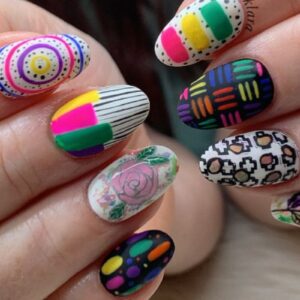
What to do if you suspect your client is experiencing domestic abuse
By Scratch Staff | 14 May 2021 | Feature, Training

Spotting the signs that someone may be experiencing domestic abuse is not always obvious, however noticing a change in a client’s personality habits can be life changing.
Abuse may be psychological, sexual, harassing, coercive, controlling or physical. You form a unique relationship with clients at the nail desk and may notice when things seem different or if a customer doesn’t seem quite like him or herself. But how do you know when they’re just having an ‘off day’ or if it is something more serious? And how do you go about approaching a client that you think may be suffering from abuse?
Lash therapist, Julie Knight is founder of Behind the Mask, an organisation that offers free training to hair and beauty professionals to help spot the signs of domestic abuse.

Julie Knight
“With a regular client, you may notice when they’re not as chatty or appear withdrawn or anxious. If they are masking injuries, they may be more careful sitting down or getting up again or they may have overdressed given the weather. You may notice that they simply ‘have to’ respond to text messages from their partner. They may comment that they’re in a hurry and need to get home and seem anxious about it.
“Some abusing behaviours may affect their appointments. They may not show up or have to cancel at short notice due to a new injury or they are simply not allowed to go out. With experience, you can tune into genuine sounding reasons for no shows and late notice cancellations.
“As we’re renowned for being great listeners, it’s no surprise that many feel comfortable talking and even confiding in us about things that they would never tell anyone else.”
“Reaching out is sensitive – you need to be mindful that you could be wrong. It’s best to consider not only what you say, but also how you say it and where you say it. In open plan treatment areas, it can be hard to be discreet, so think about when and where your opportunity may be. Trust your instinct to help you choose your moment – you’re being human after all. Depending on how any conversation went or their behaviour, something like this can help:
- Are you okay? You don’t seem your usual self?
- You seem a bit down. Has someone upset you?
- We haven’t seen much of you recently. Is everything OK?
- Wow, they text you a lot. Do they do that all the time?
- I’m worried about you. I saw how they looked at you and you seemed scared.
“They may choose to dismiss what you say and reassure you that they are okay. Respect their decision and try not to be disheartened. You’ve sewn the seed that someone cares and you could follow up with, ‘You know where I am if you need an ear’.

“But what if they do pour their heart out? Often, our first instinct is to say something like, ‘You have to leave,’ or, ‘Why are you still together?’ These are really not helpful. If it were that easy, they would have done it. There may be a long list of reasons why they are where they are. If they are being controlled, threats to harm them, their children, the family pet or other family are strong motivations to stay put. Some may not know that they have options and this is where you can really help by signposting to specialist support who will listen, not judge and offer options. You could ask:
- Is anyone helping you, like a friend, an advocate or even the police?
- Do you know where to get help or impartial advice?
- There are specialist services that can listen and advise about your options. I know where to find out about them if you would like to know more?
- Would you like to use our phone so the call doesn’t appear in your call history?
Behind The Mask offers UK hair and beauty professionals free access to online learning resources to enable them to spot the signs that someone is experiencing domestic abuse and how they could respond in the best way. Learn more at www.behindthemask.online

Read the latest issue









